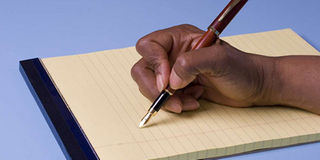Quick quiz on who is a lady and who’s a woman in media stories

Some journalists and writers use the word lady as a stand-alone descriptor for a woman. PHOTO | FILE | NATION MEDIA GROUP
What you need to know:
- A lady is a woman regarded as having the characteristics of a good family and high social position.
- The Nation Stylebook forbids the use of the word lady except as a honorific for nobility or female judges.
It’s said a lady is a woman but not all women are ladies. But is a lady a better woman? How does a journalist decide who is a lady and who’s a woman? Can a journalist truly confer lady status on a woman? And who’s a lady anyway?
Collins English Dictionary says a lady is a woman regarded as having the characteristics of a good family and high social position.
It’s also a polite name for a woman. “If you say that a woman is a lady, you mean that she behaves in a polite, dignified and graceful way,” says Collins.
The word is a class-related descriptor, born of British class culture. We’ve no local equivalence.
In order to appreciate the challenges journalists face in deciding whether to use the word lady or woman, let’s take a quick quiz.
TEST
Below are five sentences taken from media stories. Complete the blanks by inserting the word lady or woman:
1) A 28-year-old ____ stabbed her boyfriend to death in a pub in Meru. 2) Meet the first Kalenjin ____ to earn a PhD in law. 3) The DPP has launched investigations into rape allegations made by a ____ against two rugby players. 4) A ____ posing with Raila Odinga in Zanzibar responds to Kenyans who insulted her. 5) The ____ shocked Kenyans when she walked near Yaya Centre with a placard claiming President Uhuru Kenyatta is her father.
If you entered the word lady for all the sentences, you have a problem. But you’re in good company; that is the word the journalists used.
If you entered the word woman for all the sentences, you would probably make a better journalist.
The word lady is not a synonym for a woman. It’s nuanced and value-laden. That’s why it shouldn’t be used if you want to be neutral and non-judgmental, as a good reporter should.
DESCRIPTION
The use of the word lady in such sentences and contexts appears to be mindless or thoughtless. It can also be said to be patronising, demeaning, insulting or sarcastic.
Some journalists and writers use the word as a stand-alone descriptor for a woman.
Joachim Osur, who writes a sexual health column for the Nation, quotes a woman telling him: “He has infected me with a venereal disease, that is the appreciation I get for persevering his flaccid erections.”
Then Dr Osur goes on to describe her as a lady. “I nodded as the lady went on and on pouring out her heart,” he writes.
Journalists also use the word as a prefix to a name. For example, Nation veteran golf correspondent Larry Ngala calls women golfers lady golfers.
In his weekend golf summaries, he characterises women winners as lady winners.
WRITERS
It’s the same with motoring correspondent Baraza JM. He calls women car owners lady owners.
He advises: “If the Primera is in good shape, buy it, but not because it’s owned by a lady.”
Philip Kitoto, the Nation relationship columnist, also routinely calls women ladies. Typically, he writes: “Personally, I feel that this lady is wasting your time.”
Some Nation reporters will find a ‘lady’ almost everywhere, as shown in the following extract from a kidnapping story filed by a correspondent:
“There was another lady in the boot …. Once I was tied down, they pulled the lady down and tore her clothes off….” They use the word lady, whether justified or not, as a synonym for a woman.
STYLEBOOK
It’s the same with other media. KTN describes a woman who was harassed by members of the public because she was indecently dressed as a lady.
Ebru TV, in one of its talk shows, describes women who desire Nigerian men as “ladies stealing Nigerian men”.
There are many other examples. It’s no small problem. Two out of every five women mentioned in the Nation stories I examined are referred to as ladies.
The Nation Stylebook, however, forbids the use of the word lady except as a honorific for nobility or female judges. Journalists are required to use the word woman because “it’s less sexist”.
Send your complaints to [email protected]. Call or text 0721 989 264





